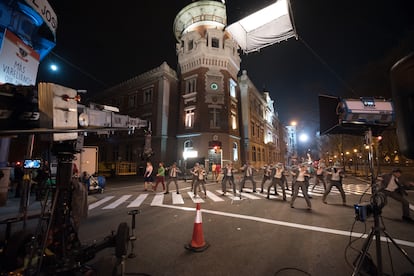Uruguay becomes key destination for international film and TV production companies
Since 2020, Netflix, Amazon, and HBO have increased filming in the South American country, which avoided shutting down during the coronavirus pandemic


The Uruguayan audiovisual industry is surging. Despite the country’s small population of 3.4 million, Uruguay produces around 20 national films every year and has become a popular shooting location for international production companies. Even during the pandemic, streaming giants like Netflix, Amazon and HBO recognized the country’s potential and favorable conditions offered by the Uruguayan government. The industry has witnessed a remarkable surge in filming activity. According to Musitelli Film & Digital, a Uruguayan company, the number of filming weeks almost doubled from 24 in 2019 to 40 in 2020, and skyrocketed to 142 in 2021.
“The audiovisual sector is going through a really exciting time right now,” says Facundo Ponce de León, president of the Uruguayan Film and Audiovisual Agency (ACAU). One of the reasons for this boom is that Uruguay was the only country in the region that allowed filming during the pandemic. “That generated an unprecedented influx of international productions,” he said. Yet, this remarkable performance was not a mere coincidence, nor can it be solely attributed to the lack of health restrictions. Ponce de León says Uruguay’s success stems from a harmonious blend of well-designed public policies, technical proficiency and artistic talent. The proximity of diverse filming locations is also very attractive. “Uruguay has to see itself as a giant film set,” says Ponce de León.
According to the ACAU, there are around 1,000 companies in the country’s audiovisual sector, creating 3,900 direct jobs. This year, they anticipate completing 100 weeks of filming for various productions. Noteworthy among the international productions are AMIA, a series that delves into the terrorist attacks in Argentina in 1992 and 1994, and The Disappearance, a film about Nazi doctor Josef Mengele’s escape to South America. Uruguay also provided authentic settings for Netflix’s Society of the Snow, an upcoming survival thriller film about the 1972 Andes flight disaster. Directed by Juan Antonio Bayona, the film enlisted Cimarrón, a leading production services company in Uruguay. ”Filming here is pretty comfortable and everything mostly goes as planned,” says Santiago López, a partner at Cimarrón. In this sense, it reflects the social, institutional and financial stability of Uruguay as the driving force behind the growth of its audiovisual industry. In 2022, the production company created 3,500 jobs for technicians, actors and extras. One example of their work is the Barrabrava (Amazon) series about a group of soccer hooligans in Buenos Aires. They were also in charge of Amsterdam (HBO Max), a series shot at the Reducto Films studios in Montevideo, which was attracted to Uruguay by the government’s audiovisual incentives program.

“This industry would disappear if it didn’t have public policy backing it up,” notes López. The Uruguay Audiovisual Program (PUA) launched in 2019 with $4 million in funding to encourage national and international productions. Successive governments continued the program and increased its funding to the current $12 million. Like other countries in the region, Uruguay implemented incentives to support the audiovisual industry. These include expense reimbursement and value-added tax (VAT) exemptions for national and foreign producers. Ernesto Musitelli thinks the country has benefited from the surge in pandemic projects and is ready for more from countries like Brazil, Argentina, Mexico and Spain. “Uruguay has positioned itself as a pretty interesting regional production center for both international and local projects,” he said. Along with its friendly people, Musitelli says the country’s creativity, talent and technical capacity are very attractive.
Uruguay may lack snow, large lakes and mountains, but it boasts expansive beaches, charming historic neighborhoods and bucolic landscapes. One of its most precious gems is Montevideo, which has captivated cinematographers with its eclectic architectural heritage. The historic city center reveals hidden gems with captivating European influences, old balconies that transport you to Havana, and Art Deco architecture that evokes New York City.
Montevideo served as the production location for the El Presidente (Amazon) series about the FIFA soccer bribery scandal in Chile, showcasing the cinematographic potential of the Uruguayan capital. Gabriel Peveroni of Montevideo Audiovisual says that during filming, the city’s racecourse was transformed into a 1936 Berlin building. Some streets in the old town were made to resemble an Asian market, while the city’s main avenue was temporarily turned into a Japanese street for a night. “We managed to set up 250 locations in just four months for that production,” says Peveroni. Over the past four years, the city has almost quadrupled the number of filming days per year, from 300 to 1,200. This increase is attributed to the annual shooting of six or seven international series and around four major films.
Peveroni acknowledges the significant impact of these series and films on local technical capacity. In 2020, many of these productions relied heavily on foreign expertise. But three years later, Peveroni notes that similar productions are being handled almost entirely with Uruguayan technicians. This even includes Uruguayan production and script development for series like AMIA, set in Argentina, for distribution throughout Latin America.

Ponce de León acknowledges the value of local talent working on foreign productions. “One of the goals of the agency [ACAU] is to make sure that we avoid creating false competition between the two. When it comes to public policy, we want to emphasize the intersection between business and culture, between production and art.”
Sign up for our weekly newsletter to get more English-language news coverage from EL PAÍS USA Edition
Tu suscripción se está usando en otro dispositivo
¿Quieres añadir otro usuario a tu suscripción?
Si continúas leyendo en este dispositivo, no se podrá leer en el otro.
FlechaTu suscripción se está usando en otro dispositivo y solo puedes acceder a EL PAÍS desde un dispositivo a la vez.
Si quieres compartir tu cuenta, cambia tu suscripción a la modalidad Premium, así podrás añadir otro usuario. Cada uno accederá con su propia cuenta de email, lo que os permitirá personalizar vuestra experiencia en EL PAÍS.
¿Tienes una suscripción de empresa? Accede aquí para contratar más cuentas.
En el caso de no saber quién está usando tu cuenta, te recomendamos cambiar tu contraseña aquí.
Si decides continuar compartiendo tu cuenta, este mensaje se mostrará en tu dispositivo y en el de la otra persona que está usando tu cuenta de forma indefinida, afectando a tu experiencia de lectura. Puedes consultar aquí los términos y condiciones de la suscripción digital.








































